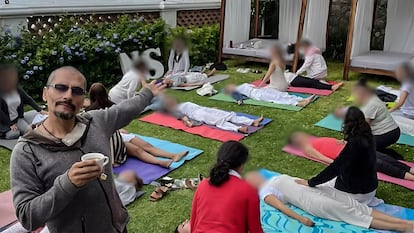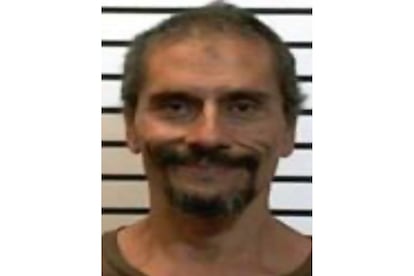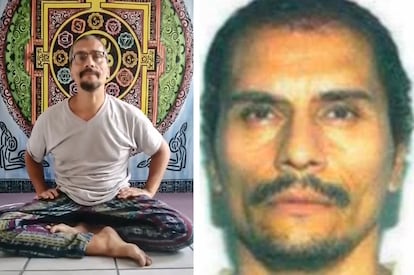A yoga instructor in Mexico turned out to be on the FBI’s Most Wanted list
Jorge Rueda Landeros – the principal suspect in a high-profile American homicide case – was detained in Mexico, where he has been working as a yoga instructor for the past 12 years under a different identity. EL PAÍS pieced this shocking story together with the help of testimonies, court documents and an interview with Landeros, who is now in jail

León Ferrara – a yoga instructor in Guadalajara, Mexico – disappeared without a trace on Tuesday of last week.
His students searched for him everywhere. The last thing they heard was that he had taken his two Pomeranians for a walk and had not returned home. As Ferrara had no partner, children, or close relatives in the city, it was his friends who had to file a missing persons case… which turned out to be fruitless. His name simply didn’t exist in the population registry.
Three days passed without a word from the missing man. Eventually, however, his students learned that their instructor’s name wasn’t León Ferrara – it was actually Jorge Rueda Landeros. And he wasn’t lost or kidnapped: he had been arrested for murder.
Landeros – a 52-year-old language and meditation teacher – is the prime suspect in the murder of Professor Sue Ann Marcum, who was killed in Bethesda, Maryland in 2010. He has been on the FBI’s Most Wanted list for the last 12 years.
“I’m innocent… not of everything, obviously. But of what I’m being accused of,” he tells EL PAÍS via phone call from a prison in Mexico City.
When asked if he ever followed his case in the news over the past decade, Landeros replies with a firm “no.”
“I didn’t follow anything. Once I disappeared from the radar, I completely forgot about [the investigation]. I still have difficulty responding to the name ‘Jorge’ – I hardly have any of him inside of me anymore.”
María – a student of Landeros, who agreed to speak with EL PAÍS on the condition that her real name not be published – is still in shock.
“I feel like I’m grieving. I know León, but I don’t know who Jorge is,” she says over the phone.
At the end of last week, she went to the Special Prosecutor for Missing Persons in the State of Jalisco, to report the disappearance of her friend and instructor. After being made to wait for seven hours, officers told her the truth:
“Your friend isn’t missing. He’s in custody and has an Interpol file. We can’t tell you more.”
“If I ever have the opportunity to sit down with him, I’ll have to ask him a lot of questions,” María sighs.
Sue Ann Marcum – a beloved professor of Accounting at American University in Washington D.C. – was found dead on October 25, 2010, at her home in Bethesda, Maryland, a small city of 65,000 people on the outskirts of the nation’s capital.
“She had a passion for teaching… she gave up everything for her students,” said Donald Williamson, her colleague, in a recorded tribute organized by the university. He had invited her to join the faculty in 1999.
At first, everything pointed to a robbery gone wrong. After receiving a 911 call, the police arrived at the crime scene shortly before eleven on Monday morning. They found the body of the victim, who appeared to have resisted before being suffocated and beaten to death by her assailant. Almost all of her valuables, however, were still at the residence. The one exception was an old Jeep Cherokee van, which was no longer parked outside her home when officers arrived on the scene.
The vehicle was recovered before midnight that same day. DeAndrew Hamlin – an 18-year-old – stole it. He was driving it during a hit-and-run and lost control of the car after a lengthy police chase. He was subsequently charged with robbery and murder. But a few months later – on April 12, 2011 – while he pleaded guilty to stealing the van, investigators had still not confirmed his involvement in the murder of Sue Ann Marcum. It was very possible that the young man had simply taken the van after finding it abandoned.
Later in April of 2011, authorities issued an arrest warrant for Landeros, after identifying his DNA at Marcum’s home, both on the murder weapon and on a glass bottle.
Marcum and Landeros were united by a passion for yoga. The victim’s friends say they met in the summer of 2005, when she took Spanish classes at a church in the Washington metropolitan area, where he was a teacher. Police reports indicate that they began a relationship in 2006. Landeros confirmed this during his phone interview with EL PAÍS.
The police found a series of files on Marcum’s computer concerning the opening of an investment fund, which was set to be managed by both of them. Investigators also found a 2008 tax return that showed financial movements of at least $100,000. Emails reveal that Marcum had issues with how Landeros dealt with money.
In a drawer, agents also discovered a life insurance policy in the victim’s name for half-a-million dollars, in which Landeros appeared as the only beneficiary.

FBI agents say that their case is strong: there was a motive and there are genetic samples from the defendant at the crime scene. The suspect also had easy access to the victim’s residence.
“The police investigation determined that Marcum fought and possibly knew her attacker,” read a document from the FBI that EL PAÍS had access to.
Landeros presented himself as a former Wall Street broker who decided to give up everything and embark on a path of self-discovery. He claimed that, when he became fed up with his life, he went to India.
Upon his return, the new Jorge was a yogi, plastic artist and poet. He had no material attachments and lived as an ascetic… although he constantly crossed the US-Mexico border to visit relatives in Texas and Virginia. He also made money from classes he occasionally taught at small cafes or spiritual centers.
“Sue talked about him like he was a god,” recalled Larry March – the friend who made the 911 call – in The Hunt, a 2016 documentary that CNN made about the murder case. “There was something about him that I just didn’t like.”
Landeros maintains that “he was not [in Bethesda] at the time.” He explains that his DNA was only at the scene of the crime because “it was a more or less intimate relationship.”
Despite his denials, the US authorities have no doubts about his culpability. Nor does Marcum’s inner circle.
In June of 2011, the arrest warrant against Landeros as the sole suspect was made official. The description noted that he had black hair, brown eyes, was 5ft10 and weighed 200 pounds; a native of Ciudad Juárez with dual nationality, the 52-year-old was a yoga and Spanish teacher.
Interpol’s red flag and the FBI’s arrest warrant marked the beginning of a new life as a fugitive. In the end, Landeros would be placed on the FBI’s Most Wanted list for murder.
Before disappearing, he took the time to contact a reporter from The Washington Post and declare his innocence. He also sent an email to an El Paso police detective: “You are cordially invited to cross the bridge [into Mexico] and meet me at Sanborn’s, a great cafeteria here in Juárez… we can talk about anything you like.” Obviously, nothing came of this.
León Ferrara was “born” shortly after Jorge Rueda Landeros made the last attempt to visit his brothers in Texas and learned of his arrest warrant. Landeros has also gone by the name Sadhu León, in reference to Indian yogis. Sometimes he passed himself off as a Brazilian, or the son of Turkish diplomats.
“León was my best friend,” says Sofía, who, like the rest of the yoga instructor’s students, has requested that her real name be concealed. She took classes with him on Tuesdays and Thursdays.
Sofia met the instructor in 2013. They became friends shortly after. She describes him as a cultured person, with a dark sense of humor. He wasn’t afraid to make very blunt comments or criticize the appearance or actions of others.
“If you have a fragile ego, you won’t get along with him.”
Sofía opened the doors of her home to León several times when it was not possible for her to leave the house to take classes. She even had him teach languages and mediation to her son.
“He was a person I completely trusted… there were times when I took advantage of the fact that he was at home with my child to go to the supermarket, for example,” she recalls.

León Ferrara – as he was known – was very involved in the lives of his closest students: he gave them relationship advice and played the role of a confidante. He claimed to have traveled a lot – he was constantly giving recommendations about special places to visit in Turkey, Spain, India, or Costa Rica.
“He was very convincing, although there were little exaggerated details in his stories, as if to make them more interesting,” says Rubén, a psychologist friend. But the world traveler never breathed a word about his past as Jorge Rueda Landeros or about the first-degree murder charges he was facing – nor did he show a hint of remorse.
“Now that I think about it, he was a total narcissist,” says Rubén.
Four other people who were close to Landeros share their feelings of sadness, worry, pain and betrayal. They wonder who that person really was and if they should have seen some warning signs. Everything they thought they knew about the yoga instructor and everything that has recently been revealed doesn’t add up: on one hand, “León” was a hippie who promoted meditation – on the other, he had an open murder case for more than a decade.
If it is proven in court that their friend is guilty, they unanimously agree that he will have to pay the price. “We’re not naive… the accusations are very serious,” María says.
Landeros doesn’t consider himself to be a hypocrite. “None of this affects what I was trying to share with [my students]... it was the practice of equanimity, the techniques that one learns with yoga, where one tries not to privilege any element of reality too much, because everything is changeable and fleeting.”
The case of Landeros went virtually unnoticed in Mexico. The Attorney General didn’t issue a statement about the arrest, nor did any other Mexican or American government official. The US media also seems to be unaware of the arrest.
While there was no official announcement about his detention, sources from within the Mexican prison system confirmed to EL PAÍS that Landeros entered his Mexico City jail cell on December 14 “under a provisional detention for extradition purposes.” In his mugshot, he appears to be smiling.
Landeros has been told by his court-appointed lawyer that, as a matter of protocol, he is to be deported to the US to stand trial. In the meantime, the yogi doesn’t seem very fond of the prison conditions south of the border.
“There is a lot of abuse of authority, there is a lot of decadence, everything is very abandoned by the hand of God,” the detainee complains.
The loved ones of Sue Ann Marcum hope that justice will be done and that her legacy prevails through her students and through the university scholarship that bears her name. Marcum was murdered at the age of 52 – the same age at which the main suspect in her murder was finally apprehended.
Meanwhile, in Mexico, those closest to a man who has, once again, disappeared from the radar resign themselves to the hope that, one day, their questions will be answered.
“León is innocent… but Jorge, I don’t know,” says María, before hanging up the phone.
Tu suscripción se está usando en otro dispositivo
¿Quieres añadir otro usuario a tu suscripción?
Si continúas leyendo en este dispositivo, no se podrá leer en el otro.
FlechaTu suscripción se está usando en otro dispositivo y solo puedes acceder a EL PAÍS desde un dispositivo a la vez.
Si quieres compartir tu cuenta, cambia tu suscripción a la modalidad Premium, así podrás añadir otro usuario. Cada uno accederá con su propia cuenta de email, lo que os permitirá personalizar vuestra experiencia en EL PAÍS.
¿Tienes una suscripción de empresa? Accede aquí para contratar más cuentas.
En el caso de no saber quién está usando tu cuenta, te recomendamos cambiar tu contraseña aquí.
Si decides continuar compartiendo tu cuenta, este mensaje se mostrará en tu dispositivo y en el de la otra persona que está usando tu cuenta de forma indefinida, afectando a tu experiencia de lectura. Puedes consultar aquí los términos y condiciones de la suscripción digital.









































